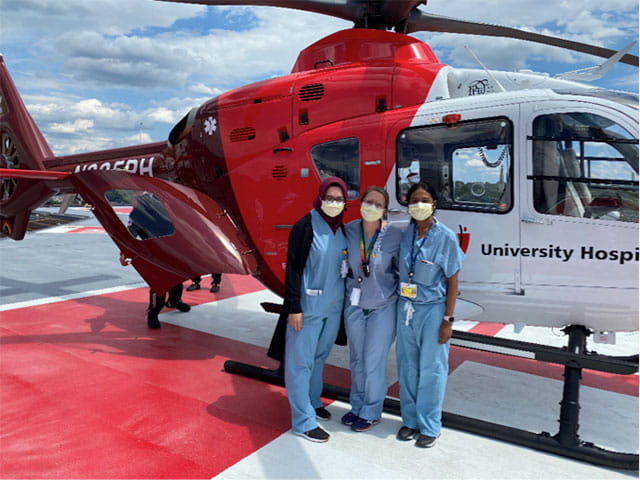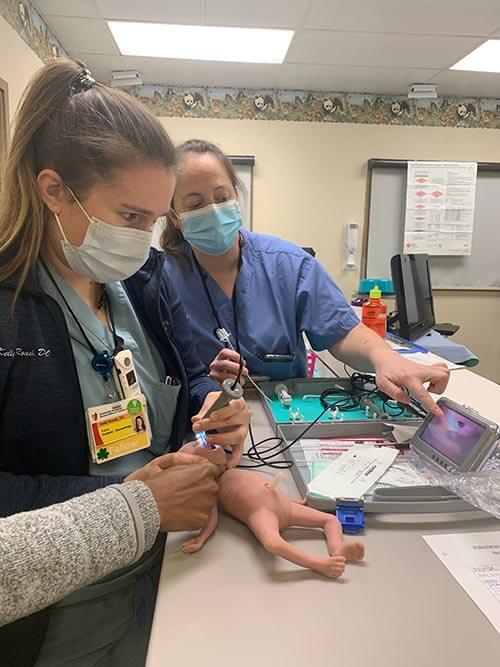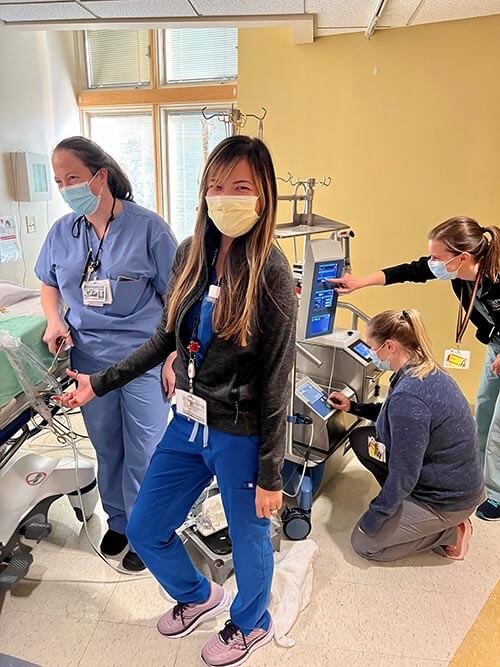Clinical Training
From the first day of their fellowship training, our fellows are provided diverse clinical experiences that ensure they graduate with the necessary and latest skills for neonatal management. During the three years of fellowship, fellows are required to complete 52 weeks of clinical service in the NICU, on the Rainbow 4 Transitional Care Unit, and at University Hospitals MacDonald Women's Hospital performing antenatal consultations and leading neonatal resuscitations. Fellow clinical time also includes neonatal follow-up clinics, a cardiothoracic surgery rotation, and a culminative NICU acting-attending experience. Beginning with fellows entering the program in 2022, there will be a two-week rotation at MetroHealth Hospital’s Level III NICU in the second year of training. Individualized elective rotations pertinent to the fellow’s chosen career path are strongly encouraged during the third year of the fellowship.
Fellows develop skills as Med Command for the many critically-ill infants transported to the NICU at University Hospitals Rainbow Babies & Children's Hospital. We receive patients from hospitals all over Northeast Ohio including other tertiary care centers, and occasionally from nearby states. When possible, fellows will have the opportunity to accompany the transport team by air or ground for the sickest infants. On average, the NICU receives approximately 300 transports annually.
 All fellows are required to participate in at least one quality improvement (QI) initiative during their fellowship training. UH Rainbow, and particularly the Division of Neonatology, has a long history of work in patient safety and QI in local, regional, and national collaboratives. Many fellows have presented their QI work in national forums and have published manuscripts stemming from these projects.
All fellows are required to participate in at least one quality improvement (QI) initiative during their fellowship training. UH Rainbow, and particularly the Division of Neonatology, has a long history of work in patient safety and QI in local, regional, and national collaboratives. Many fellows have presented their QI work in national forums and have published manuscripts stemming from these projects.


Facilities
Neonatal Intensive Care Unit
Fellows train in the Quentin and Elisabeth Alexander Neonatal Intensive Care Unit. Opened in 2009, the 38-room (~42 bed) Level IV Neonatal ICU admits approximately 1,200 newborns each year with between 140-180 of those infants being <1500 grams at birth.
Along with a nationally recognized group of subspecialists and surgeons, fellows manage infants with tools such as bedside ultrasound, nitric oxide, high frequency ventilation, and ECMO. NICU teams are also complemented by neonatal nutritionists and pharmacists during rounds as well as dedicated neonatal social workers.
Rainbow 4 Transitional Care Nursery
The Rainbow 4 Transitional Unit complements the NICU with the addition of approximately 40 beds. On this unit, fellows care for chronically ill infants, infants with Neonatal Opioid Withdrawal Syndrome, neonates that require special care immediately after delivery, and patients transferred from the NICU as they are preparing for discharge to home. Fellows work as part of a multi-disciplinary team that includes neonatologists, advanced practice providers (NPs, PAs, neonatal hospitalists), nutritionists, palliative care specialists, OT/PT/Speech providers, and social workers.
University Hospitals MacDonald Women’s Hospital/Newborn Nursery
Over 4,000 infants, including those with prenatally diagnosed conditions, are delivered annually in the UH MacDonald Women’s Hospital. Fellows lead neonatal resuscitations along-side a team of respiratory therapists and neonatal nurses and perform antenatal consultations for women admitted to UH MacDonald with high-risk pregnancies.
High-Risk Neonatal Follow-up Clinic
Our division has a strong tradition of following our vulnerable patients beyond NICU discharge. Originally established in 1977 by Dr. Maureen Hack, the High-Risk Neonatal Follow-up Clinic provides a research setting for neurodevelopmental evaluation of the NICU graduates who are extremely premature or enrolled in specific studies with follow-up. Our fellows also attend our Neonatology Extended Outpatient Clinic which provides medical follow-up of infants born at <1500g or < 32 weeks gestation or are medically complex. This clinic allows for continuity of patient care with a multidisciplinary framework and collaboration with primary care physicians, Fellows become comfortable with post-discharge management of premature infants including home oxygen therapy and growth/nutrition. Many fellows look forward to being able to reconnect with the patients that they formed strong bonds with during their time on clinical service.
Pediatric Library
The Samuel J. Horwitz, MD Pediatric Learning Center (PLC) is a clinically oriented library focused on Pediatrics and geared to support resident and fellow education as well as assist in continued learning for all UH Rainbow faculty and staff.
The facility houses a printed reference collection, a number of computer-equipped workstations, and provides access to printing, scanning, and photocopy equipment.
The center is staffed by a full-time librarian and is open 24/7 with a door key code. Along with printed books and journals, the library subscribes to a number of electronic resources, available from the PLC website, and provides a number of specialized research guides and tools. Library services include reference and mediated literature searching, database training, and interlibrary loan assistance.
Pediatric Learning Center
Tel: 216-844-3265
Fax: 216-844-1724
pediatriclearningcenter@uhhospitals.org


